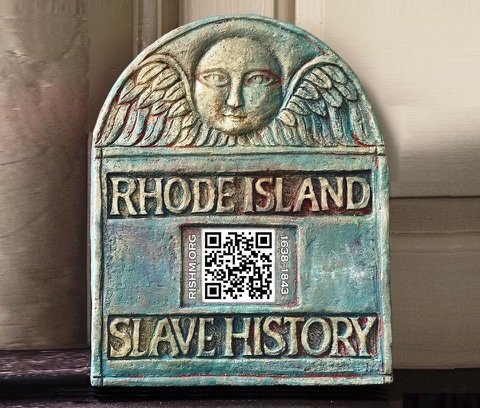Charles Roberts, Founder of RISHM, with Reverend Bishop Nicholas Knisely and Reverend Canon Timothy Watt at the dedication of the medallion marker at Trinity Church in Newport.
At the core of Rhode Island Slave History Medallion's (RISHM) mission lies its commitment to nurturing healthy communities where medallion markers promote recognition of the lives and contributions of people of color in our nation's founding and for nearly four centuries. RISHM conducts research and collaborates with historic sites to install bronze medallions. They also organize public ceremonies that unveil the little known stories of the enslaved, honoring their lives and contributions through multicultural performances and humanities programs helping to inspire understanding and foster racial healing.
These medallion markers highlight Rhode Island's rich and diverse cultural heritage, extracting documented stories of Black and Indigenous people from dusty history archives and placing them squarely in the light for all to access. In doing so, these medallions challenge the prevailing, exclusive narrative of white-only history by providing an inclusive lens through which our diverse population can engage with history, explore their heritage, cultivate deeper empathy, and foster a healthier, more inclusive environment.
The first maker was installed at Bowen's Wharf in Newport, a site that witnessed the arrival and departure of enslaved individuals on sailing ships during the 18th century, as well as their labor in trades related to maritime commerce. Since the installation of this first marker, the project has expanded significantly, with additional markers finding homes in Barrington, Bristol, East Greenwich, Jamestown, Newport, North Kingstown, Portsmouth, Providence, and Warren.
RISHM's ambitious goal is to install at least one medallion in each of the 25 Colonial era cities and towns linked to slavery, thus creating a comprehensive Medallion Map of Remembrance. This map, a vital component in Rhode Island’s Heritage and Cultural Diversity program, will serve as both a physical and a virtual roadmap, guiding residents, students, researchers, visitors, and particularly families of BIPOC descent toward an inclusive understanding of our state's history.
In addition to their medallion installations, RISHM offers a breadth of related programming, including walking tours, speaking engagements, events celebrating Black History Month and Juneteenth, anti-bias training, and curriculum development.
We encourage you to visit the medallion sites, scan the associated QR codes, and delve into the important stories anchored in these locations. RISHM offers us a vital opportunity to deepen our understanding of Rhode Island's history and heritage. For more detailed information about the sites and programming, please visit https://rishm.org/.


